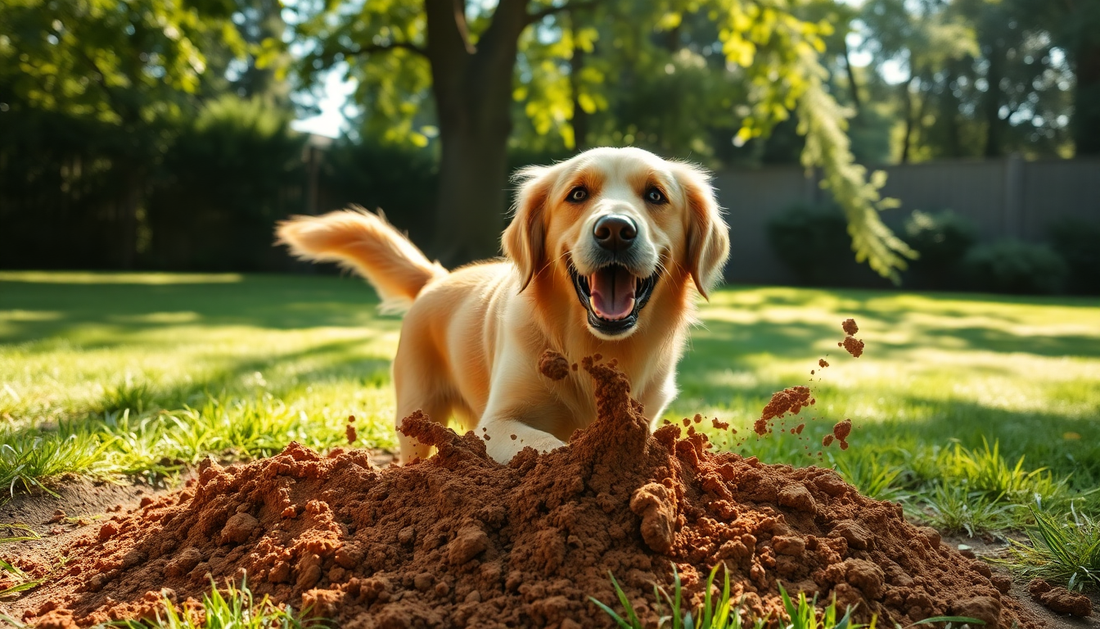
Why Is My Dog Digging Up the Yard?
Share
If you're a dog lover and a homeowner, chances are you've come home to find your once pristine backyard looking more like a lunar landscape than a peaceful oasis. Ah, the joys of canine landscaping! While it may be frustrating to see your pup's handiwork, take solace in the fact that you're not alone. Digging is a perfectly natural behavior for our four-legged friends, and understanding the reasons behind it can help you find a solution.
Reasons Dogs Dig
There are several common reasons why dogs feel the need to get their paws dirty:
Boredom
Let's face it, sometimes our pups just need a little more excitement in their lives. A dog left to their own devices with nothing to do is a recipe for disaster—or at least a well-aerated lawn. Digging provides mental and physical stimulation, and can be a way for your furry friend to alleviate their boredom.
Hunting Instinct
Many dogs, especially those with terrier or hound lineage, have a strong prey drive and hunting instinct. They may be digging in search of small animals, like mice or moles, that have made their home beneath the surface.
Seeking Comfort
Believe it or not, some dogs dig to create a cozy, temperature-regulated spot to rest. They may be trying to find a cool spot to escape the heat or a warm, insulated den to curl up in.
Anxiety or Stress
Digging can also be a symptom of underlying anxiety or stress. Your dog may be trying to self-soothe or find a safe, secure place to hide.
Breed-Specific Tendencies
Certain breeds, like Dachshunds and Siberian Huskies, are simply more predisposed to digging behaviors due to their genetic makeup and historical purpose.
Understanding Your Dog's Motivation
The first step in curbing your dog's digging habit is to identify the root cause. Pay attention to when and where they're digging, as well as any accompanying behaviors. Are they focused on a specific area of the yard? Do they seem agitated or anxious before they start digging? Recognizing the triggers can help you determine the underlying reason and address it accordingly.
Practical Solutions
Exercise and Mental Stimulation
A tired dog is a well-behaved dog, as the saying goes. Make sure your pup is getting enough physical and mental exercise to prevent boredom-induced digging. Take them on long walks, play fetch, or try interactive toys and puzzles to keep their mind engaged.
Training Techniques
Teach your dog the "leave it" or "stop" command and be consistent in redirecting their digging behavior to more appropriate outlets, like a designated digging area or sandbox.
Create a Digging Zone
Speaking of designated digging areas, consider setting aside a specific spot in your yard where your dog is allowed to indulge their natural instinct. Bury treats or toys to encourage them to dig in that area.
Address Anxiety
If your dog's digging seems to be stress-related, try to identify and mitigate the source of their anxiety. This may involve calming supplements, anxiety-reducing products, or even consulting a veterinary behaviorist.
Wrap Up
While most dog digging can be managed with a little patience and the right approach, there are times when it's best to seek the guidance of a professional. If your dog's digging becomes excessive, destructive, or seems to be a symptom of a deeper behavioral issue, it's a good idea to consult your veterinarian or a certified dog trainer or behaviorist.
In the end, remember that dogs will be dogs. Their digging tendencies are a natural part of who they are, and with a little understanding and the right strategies, you can find a way to coexist peacefully—or at least maintain a reasonably intact backyard.
